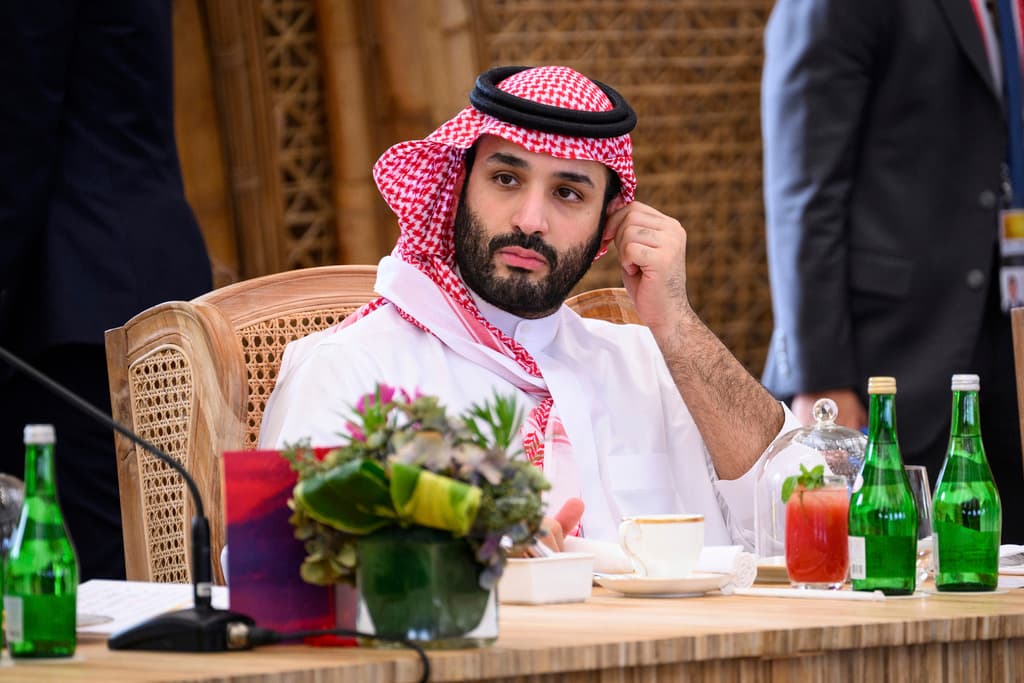With Gaza War Seemingly Over, Trump Rekindles Idea of Saudi Arabia Joining Abraham Accords
Will economic, security, and intelligence incentives, rather than an ever-elusive search for Palestinian statehood, catalyze a major Middle East breakthrough?

As President Trump rekindles hope of a normalization of Saudi-Israeli ties, will economic, security, and intelligence incentives, rather than an ever-elusive search for Palestinian statehood, catalyze a major Middle East breakthrough?
If Saudi Arabia joins the Abraham Accords of Mr. Trump’s first term, “everybody goes in,” the president told Fox Business on Friday, adding that the Saudis are renewing interest in peace with Israel. Israelis, meanwhile, hope to lure Riyadh with a proposed pipeline that could significantly cut costs of exporting Saudi oil to Europe.
Crown Prince Mohammed bin Salman’s drastic social, cultural, and economic reforms are angering some of the country’s old guard. Despite significant strides, the de facto ruler of the Saudi kingdom, known as MbS, is adhering to some of the sensibilities that have guided his father, the 89-year-old King Salman, who rarely appears in public nowadays.
Reading internal deliberations at the kingdom’s palace is “like Sovietology,” the executive director at the Foundation for Defense of Democracies, Jonathan Schanzer, tells the Sun. Yet, he adds, the “conventional wisdom” is that MbS will formalize relations with Israel only after his father dies.
For now, Prince Mohammed is conditioning peace with Israel on a path to a Palestinian state. Since October 7, 2023, though, Israelis have become increasingly leery of that idea, and Prime Minister Benjamin Netanyahu has vowed to prevent statehood. Mr. Trump is uncommitted: “We will have to see,” he said this week.
Could other factors, though, help diplomats bridge the Palestinian statehood dispute, and push Riyadh to join the Abraham Accords?
During a recent trip to Washington, the Israeli energy minister, Eli Cohen, presented to his counterpart, Secretary Chris Wright, a plan to create a new oil pipeline directly between Saudi Arabia and Israel. From there oil would get to Europe through the Mediterranean Sea in “the shortest, quickest, and safest route,” Mr. Cohen said.
Currently, Saudi oil is mostly exported to Europe on tankers moving between the Persian Gulf and the Red Sea through Egypt’s Suez Canal. In addition to that route being significantly more expensive than the proposed Israeli pipeline, it is fraught with dangers, as the Islamic Republic of Iran often threatens to shut down the Strait of Hormuz, which would block Saudi oil tanker movement.
The Israeli proposal involves building a 430-mile land pipeline between Saudi Arabia and Eilat in southern Israel. Oil would then flow via the Trans Israel Pipeline to the port of Ashkelon, and from there it would go to Europe through the Mediterranean in oil tankers.
Another incentive for Prince Mohammed, who is scheduled to visit Washington next month, is a mutual defense agreement with America akin to the executive order Mr. Trump signed with Qatar last week. “There are discussions about signing something when the crown prince comes, but the details are in flux,” an administration official told the Financial Times on Friday.
Talk about improving Saudi-Israeli relations is far from new. In the summer and fall of 2023, Jerusalem and Riyadh conducted intensive talks about formalizing ties. Both MbS and Mr. Netanyahu publicly said negotiations were in advanced stages. That year’s Hamas atrocities were at least in part designed to prevent completion of that diplomacy.
The two-year war made it politically difficult for Arab leaders to express warmth toward the Jewish state. Yet, leaked American documents show that “even as key Arab states condemned the war in the Gaza Strip, they quietly expanded security cooperation with the Israeli military,” the Washington Post reported.
Joining the Abraham Accords became a difficult proposition for Riyadh and other countries that are yet to formalize relations. “They couldn’t have done it during the war,” Mr. Trump said Friday. Now, though, “I hope to see Saudi Arabia go in” and join the Abraham Accords. “I think when Saudi Arabia goes in, everybody goes in.”
He added that the Saudis indicated interest in joining the accords “even as recently as, like, yesterday.” Mr. Trump noted that the previous Abraham Accords signatories, including the United Arab Emirates and Bahrain, maintained commercial and other ties with Israel despite the images from Gaza.
Now that the war seems to be over, Prince Mohammed might have enough economic and security incentives to join them and finalize the process that Hamas has interrupted. “I’ve heard from lots of different good sources that MbS is still very taken with the idea of normalization,” Mr. Schanzer, who often visits Riyadh, says.

